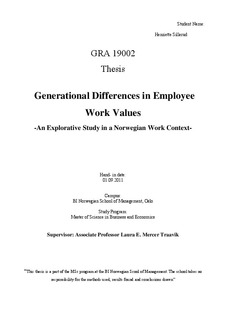Generational differences in employee work values : an explorative study in a Norwegian work context
Master thesis
Permanent lenke
http://hdl.handle.net/11250/94901Utgivelsesdato
2012-05-15Metadata
Vis full innførselSamlinger
- Master of Science [1621]
Sammendrag
In an increasingly knowledge intensive economy, it is essential to determine what drives knowledge workers into action and motivate them to excel. According to the value- based view on motivation, work values underlie these mechanisms and work value differences are therefore important to consider where they appear. In the present research, the potential effect of generation was examined. While previous research suggests that generational differences exists, there have been conflicting findings in respect to their effect on work values. The present study aimed to test whether significant differences in work values would prevail between three generations of Norwegian knowledge workers. Second, it explored whether other demographic characteristics may explain larger parts of the variance. The findings suggest that marital status and parenthood moderated the relation between generation and social, altruistic and freedom work values. Significant effects were identified for education, gender and generation. In particular, those belonging to Generation X and Y placed larger importance on extrinsic work values than Baby Boomers. Further, gender seems to have an effect on work values as women placed larger emphasis on intrinsic aspects than men. Educational level was positively related to extrinsic and intrinsic work values. For generation and gender, these effects were nevertheless small. By contrast, educational level seemed to be a viable predictor of work values. Thus the study concludes that generational differences are unlikely to translate into meaningful differences and comprise of sources of conflict at the workplace. Policies designed to accommodate for generational differences are therefore likely to be of little practical value to organizations.
Beskrivelse
Masteroppgave(MSc) in Master of Science in Business and Economics - Handelshøyskolen BI,2012
